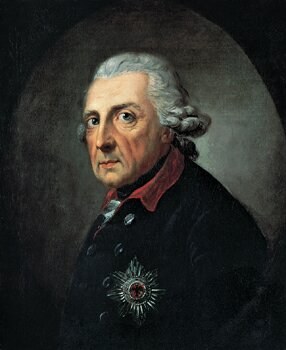January 24: Frederick the Great
Frederick the Great of Prussia (1712)
It was on this date, January 24, 1712, that Frederick the Great was born in Berlin (he was also called Frederick II, Friedrich der Große and Friedrich II). The future Hohenzollern King of Prussia spent his youth under a harsh and pious father, for whom Frederick learned to hide his hatred, and trained for a military career until he saw a chance to escape to England. His father caught him, forced him to watch an accomplice executed, and in 1733 compelled him to marry.
In his Anti-Machiavel, which he wrote before his accession IN 1740, Frederick urges monarchs to be "the first servant of the State." He followed his own advice. While distinguishing himself as a military leader, Frederick's youthful training in the arts balanced his character. He not only played the flute and composed music still performed today, but ruled Prussia with enlightenment and concern for the people. While the institution flourished in France and Russia, he abolished serfdom within his domains.
Frederick created a stable legal code, established a superior school system, allowed a free press and religious toleration — "All religions must be tolerated," said Frederick, "... every man must go to heaven in his own way." Frederick was a patron of art and literature (he befriended and protected Voltaire), as well as music. His court musicians included C.P.E. Bach and Johann Joachim Quantz.
To his intimates, Frederick admitted his Atheism, but outwardly even a monarch could not profess such a thing. His letters, especially those exchanged with Voltaire, show his Rationalist side.[1] In a letter to Voltaire before his accession, Frederick wrote:
Theologians are all alike, of whatever religion or country they may be. Their aim is always to wield despotic authority over men's consciences. They therefore persecute all of us who have the temerity to unveil the truth.[2]
After his accession, Frederick wrote to Voltaire:
If the philosophers were to form a government, the people, after 150 years, would forge some new superstition, and would either pray to little idols, or to the graves in which the great men were buried, or invoke the sun, or commit some similar nonsense. Superstition is the weakness of the human mind, which is inseparably tied up with it; it has always existed, and always will.[3]
Frederick the Great died on 17 August 1786. It was Frederick who said, "There are so many things to be said against religion that I wonder they do not occur to everyone."[4]
[1] Frederick II of Prussia, Collected Works, 31 vols., 1846-57. [2] Frederick to Voltaire, 4 November 1736. [3] Frederick to Voltaire, 1766. [4] Rufus K. Noyes, Views of Religion, 1906.
Originally published January 2004.


